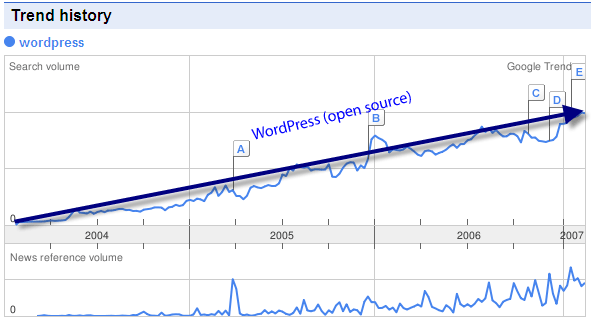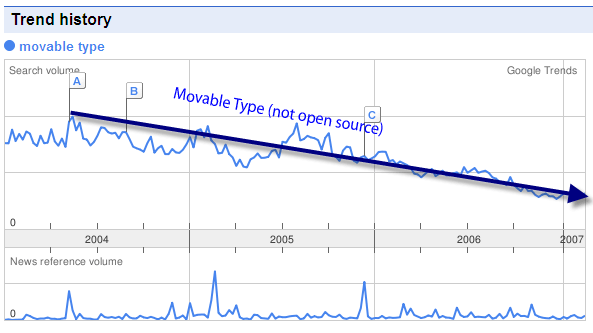WordPress vs. Movable Type: The Advantages of Open Source and What It Means for Technical Writers
I use several open source applications (Filezilla, Audacity, Firefox, 7-zip), and while I love them all, I'm really passionate about WordPress. WordPress is the open source blogging software that runs this site. It's particularly interesting to compare WordPress to Movable Type, which is not open source. Whenever I search for comparisons between WordPress and Movable Type, 99% of the time I find people explaining their conversion from Movable Type to WordPress.
Google Trends agrees with this movement. Trends show that more people are searching for the word "WordPress," which I think implies that more are embracing it.

In contrast, Movable Type seems to be on the decline (at least in the consumer market).

Google Trends also shows the top cities where the keyword is searched. For "WordPress," the top searching cities are in Malaysia, Indonesia, and Singapore (all developing countries, where open source apps would be more accessible). In contrast, the top cities searching for Movable Type are all in Japan. This is in part because Movable Type offers a localized Japanese version.
Why Is WordPress More Popular?
Why is WordPress more popular than Movable Type (at least outside of Japan)? The source code is free for anyone to use, without charge. Go to WordPress.org and download it. But just making a product free doesn't guarantee its popularity. What makes WordPress popular is the vibrant developer community behind it. For example, Mike Rundle of Businesslogs points out the size of the WordPress's community:
There are few open source projects in the world that have as strong a following as WordPress does. Every single user is an advocate, every designer an enthusiast, and you can hardly walk around the blogosphere without tripping over a WP plugin that does something interesting or useful.
Because more developers are using the software, they find bugs, engineer additional functionality, and feed those enhancements back into the original. So the real genius of open source software isn't just that it's free, but that it harnesses collective intelligence to make a superior product. I suppose this is a bit circular, because you couldn't get the global developer community without the software being free. But just being free doesn't guarantee the community or popularity.
In an article in MoreBusiness.com, a writer explains the power of collective intelligence in software development:
No company, not Microsoft and certainly not Extropia.com, could ever "hope to hire enough talented people to write all the code that this market will support" . . . Even Microsoft agrees. In the infamous Microsoft internal policy memorandum called the "Halloween Document" released last year, the Redmond colossus admits that "the ability of [open source] to collect and harness the collective IQ of thousands of individuals across the Internet is simply amazing. More importantly, OSS [open source software] evangelization scales with the size of the Internet much faster than our own evangelization efforts appear to scale."
Just like Wikipedia trumped Britannica in scope, relevance, and speed, the same applies to open source software. The question for tech writers is, what does open source mean for us?
How Do Open Source Trends Affect Tech Writers?
I think open source trends will have several impacts on technical writers:
- Wikis will be a main tool for gathering documentation, and hundreds of users will contribute. (If hundreds aren't contributing, there isn't a vibrant community around the open source project, and it won't take off — at least not for a while.)
- You can sell your own tutorials, books, and guides around open-source software to users who don't want to learn help through a possibly hard-to-navigate wiki. In this sense, tech writers may learn to be more independent and entrepreneurial.
- Companies may sell the technical publication deliverables as peripheral sales to the open source software. In other words, companies may release the software for free, but charge for the training, user guides, job aids, and so on. And some companies may go weaker with documentation altogether, relying on user-contributed content. The release of Yahoo Pipes, which had little instruction, followed by users who created professional video tutorials for the product, point to the possibility that users (on a global scale) can and will contribute instruction in place of professional technical writers.
- Documentation will never be done. As long as developers continue to add enhancements, new functionality, fix quirks, and make other improvements, the documentation will be in a constant state of flux, with some help pages out of date with each new release. If you're a tech writer for such a project, the documentation will be like a living child, always growing, maturing, asking harder questions, getting into more trouble.
- Standards for grammar and literacy will decline. Sure people will always prefer well-written, clean, grammatically accurate instructions. But as user contributions flood the wikis, users will be accustomed to reading illiterate-but-still-accurate instructions that answer their questions.
WordPress offers a great open source documentation wiki as a sample of what's to come.
What do you think? Am I on target, or am I knee deep in speculation?
About Tom Johnson

I'm an API technical writer based in the Seattle area. On this blog, I write about topics related to technical writing and communication — such as software documentation, API documentation, AI, information architecture, content strategy, writing processes, plain language, tech comm careers, and more. Check out my API documentation course if you're looking for more info about documenting APIs. Or see my posts on AI and AI course section for more on the latest in AI and tech comm.
If you're a technical writer and want to keep on top of the latest trends in the tech comm, be sure to subscribe to email updates below. You can also learn more about me or contact me. Finally, note that the opinions I express on my blog are my own points of view, not that of my employer.
